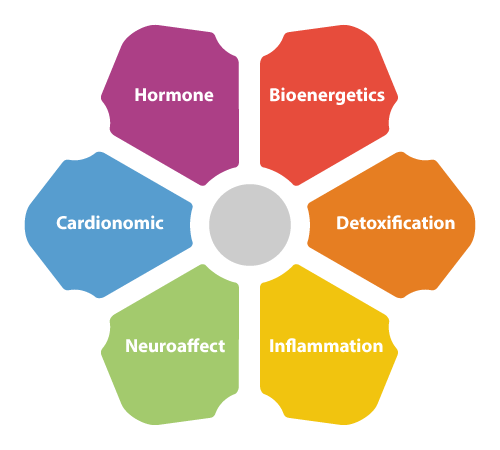 The simplest description of telehealth is healthcare provided remotely by making use of virtual technologies and telecommunications, for example, via the phone, online audio and video calls, and email. What this essentially means is that you can be at home and still receive guidance and support from your healthcare provider. There are several advantages of telehealth, which we’ll outline in this article. And we’ll also give you an idea of what you can expect.
The simplest description of telehealth is healthcare provided remotely by making use of virtual technologies and telecommunications, for example, via the phone, online audio and video calls, and email. What this essentially means is that you can be at home and still receive guidance and support from your healthcare provider. There are several advantages of telehealth, which we’ll outline in this article. And we’ll also give you an idea of what you can expect.
Telehealth may be suitable for helping you manage your chronic conditions through expert guidance in areas such as nutrition, sleep hygiene, physical activity, relaxation techniques, supplements, and the use of devices or technologies to support your recovery process. But it’s not for emergencies or acute flare-ups that require in-person care at a facility.
Some of the advantages of telehealth are that it:
Telehealth fills in a gap in modern conventional medical practices in preventing and caring for chronic conditions.
If you’re like most people, you go to the doctor when you’re sick. And if you’re more health-conscious than most, you may also go for a routine check-up once a year, even if you’re healthy. In the first case, since you’re already sick you won’t be able to use preventative healthcare. Showing symptoms can also be an indication that your health has been declining for quite some time.
In the second case, even if your test results come back negative and you’ve been given a clean bill of health, you probably won’t be given any tips on preventative measures to keep health problems at bay. So, if you’re not actively following good nutrition and lifestyle practices, it’s only a matter of time before the second scenario becomes the first.
Conventional medicine does have a lot of value and is highly effective—and unmatched—for handling acute conditions and emergency situations. In fact, these days you’re almost guaranteed to survive a heart attack if you make it to the hospital on time, which was not the case 20 years ago. Nonetheless, conventional medicine falls short when it comes to preventative practices and caring for chronic conditions, with a few exceptions, of course. Indeed, some healthcare practitioners are aware of these important issues.
To illustrate how telehealth works, let’s consider nutrition. This one of the most overlooked and underestimated areas in modern medicine, yet is now believed to have one of the biggest—if not the biggest—impacts on health and wellbeing.
Since most people are rarely offered good nutritional advice from their physician, the majority of people do not understand the importance of diet in preventing, managing, and recovering from chronic conditions.
Endocrinologists provide generic guidelines to diabetics on counting carbs and measuring insulin—but not much else. Once the acute symptoms of a chronic condition are dealt with (albeit quite effectively) in a facility, most people are just given medications to stop the condition from progressing further and to manage symptoms. But few patients are provided with ideas on how to recover their vitality and sense of wellbeing. Instead, you may feel condemned to your fate, which was apparently dictated by genetics and your family’s medical history.
Sadly, the majority of chronic conditions could have been predicted in advance and even prevented by making dietary changes.
 Almost all chronic conditions have the same root cause: chronic inflammation. The Inflammation Circuit—comprised of the Immune system, gastrointestinal (GI) tract, and gut microbiome—is part of the NeuroEndoMetabolic (NEM) Stress Response System, your body’s built-in system for managing stress. Chronic inflammation usually begins in the gut and is caused by dysbiosis (imbalances in the microbiome) or a leaky gut—if toxins, food particles, and pathogens are allowed to leak through the gut lining and into the bloodstream, they can cause immune responses and inflammation.
Almost all chronic conditions have the same root cause: chronic inflammation. The Inflammation Circuit—comprised of the Immune system, gastrointestinal (GI) tract, and gut microbiome—is part of the NeuroEndoMetabolic (NEM) Stress Response System, your body’s built-in system for managing stress. Chronic inflammation usually begins in the gut and is caused by dysbiosis (imbalances in the microbiome) or a leaky gut—if toxins, food particles, and pathogens are allowed to leak through the gut lining and into the bloodstream, they can cause immune responses and inflammation.
If you don’t address the leaks and dysbiosis in your gut, inflammation will continue, and eventually become chronic as it spreads to other organs and systems creating a lot of damage along the way. For example, inflammation of the brain and nervous system can cause brain fog, mental health issues, and can trigger or worsen neurodegenerative conditions. Furthermore, inflammation of the joints creates pain, and within the GI tract and gut microbiome, causes digestive disorders.
The single biggest factor that causes dysbiosis and leaky gut syndrome is the food you consume. Eating an unhealthy diet, foods you’re sensitive to, too much sugar, unhealthy fats, common problem foods like gluten and dairy, and foods that contain a lot of chemicals like pesticides and artificial additives, as well as drinking too much alcohol and sodas and not getting enough fiber and nutrients, can cause imbalances in your gut microbiome and contribute to chronic inflammation.
Many doctors are not adequately trained in nutrition and so you probably won’t get much advice on changing your diet. Which simply means you may end up compounding your health condition by eating the same poor diet and taking medications that cause even more inflammation. Enlisting the guidance of an expert through telehealth may end up saving you from years of suffering by simply giving you the tools you need to change your diet.
Telehealth nutrition can help you with a customized diet that matches your specific needs, and will also give you support and encouragement while you go through the process of changing your eating habits. And all from the comfort of your own home.
Chronic conditions are not yet widely accepted by the medical community, but pose a significant challenge for many people. In fact, doctors have only recently started to accept chronic fatigue syndrome as a valid condition. Before this, if you suffered from the condition, you were left hopeless and helpless by doctor after doctor. You probably would have been told you’re perfectly fine and it’s all in your head. Or perhaps, misdiagnosed with something else like depression or anxiety.
That’s what is happening right now with Adrenal Fatigue Syndrome (AFS). The chronic and possibly debilitating condition can arise if you’re exposed to chronic stress for a prolonged period of time. Too much stress means your adrenal glands have to work much harder to produce more of the main stress hormone, cortisol¬—as well as other hormones that support the fight-or-flight response. During the early stages of AFS, your cortisol levels increase, which brings along its own set of symptoms. But once your adrenals reach the point of exhaustion, cortisol levels drop and you move into the advanced stages of AFS and more and more symptoms begin to pop up.
 The most common symptoms of AFS are fatigue, unexplained weight gain and difficulty losing it, sleep-onset and sleep-maintenance insomnia, hair loss, dry skin, food and drug sensitivities, frequent colds and flu, low libido, premenstrual syndrome (PMS), infertility, hypoglycemia, constipation, brain fog, feeling “wired and tired”, heart palpitations, anxiety, and mild depression.
The most common symptoms of AFS are fatigue, unexplained weight gain and difficulty losing it, sleep-onset and sleep-maintenance insomnia, hair loss, dry skin, food and drug sensitivities, frequent colds and flu, low libido, premenstrual syndrome (PMS), infertility, hypoglycemia, constipation, brain fog, feeling “wired and tired”, heart palpitations, anxiety, and mild depression.
The reason these symptoms are so varied is because Adrenal Fatigue is associated with dysregulation of the NEM Stress Response System, your body’s global response to stress. The NEM is composed of six circuits that work together to fight stress: Hormone, Bioenergetics, Neuroaffect, Cardionomic, Inflammation, and Detoxification. The adrenal glands are an important part of the Hormone Circuit but can affect all of the other circuits, too.
When the adrenals become dysregulated, the rest of the NEM has to compensate. And if the stressor is not addressed, all of the other circuits of the NEM will eventually become dysregulated as well. That’s why you see such a wide range of symptoms, from those associated with dysregulation of the autonomic nervous system to reproductive and GI tract issues.
Because modern life is fast-paced and stressful, convenience foods and poor sleep quality are the norm. As a result, we estimate that at least 80% of the US population will suffer from AFS and dysregulation of the NEM Stress Response System at some point in their lives. And unfortunately, most people won’t get the help they need because general practitioners and other healthcare providers are still not aware of AFS and the NEM Stress Response System. Or if they are, they don’t know how to treat the condition properly.
This is where telehealth can come in handy. Most of our clients come to us after they have exhausted all other possibilities with their regular healthcare providers and have found no relief. They decide to take matters into their own hands and search online for clues. As they read through our articles and watch our videos, they realize they fit the profile of someone suffering from Adrenal Fatigue.
You can take our quick online adrenal fatigue test to determine whether or not you may have AFS.
Some of our readers can get all the information they need from our free content to start taking the steps toward recovery including changing your diet and lifestyle. However, many have more advanced conditions or concomitant issues, or feel they need personal support and an individualized approach to help them along the path to recovery, so they reach out for expert guidance.
We follow a three-step process with all of our telehealth clients, which you can easily follow:
 Once you join our recovery program, you’ll be given a personalized recovery blueprint for your specific needs and condition, and you can rest assured that it will be based on a comprehensive total-body approach with no gaps or questions marks. To see some of the video testimonials from our clients and learn more about our services, click here.
Once you join our recovery program, you’ll be given a personalized recovery blueprint for your specific needs and condition, and you can rest assured that it will be based on a comprehensive total-body approach with no gaps or questions marks. To see some of the video testimonials from our clients and learn more about our services, click here.
Please remember, changing your diet and lifestyle takes time, and no two people are alike. So, what works for one person may not work for you. This is especially true when it comes to supplements, so be careful if you choose to embark on this journey alone. And even with expert help, it will take time and patience. But at least you’ll be addressing the root cause rather than superficially treating symptoms.
© Copyright 2020 Michael Lam, M.D. All Rights Reserved.
Because most chronic conditions stem from inflammation and poor diet, getting the tools, guidance and support from a leading expert in nutrition and lifestyle might be exactly what you need. And telehealth makes getting access to such experts easy and convenient. Read on to see if it suits your situation.
